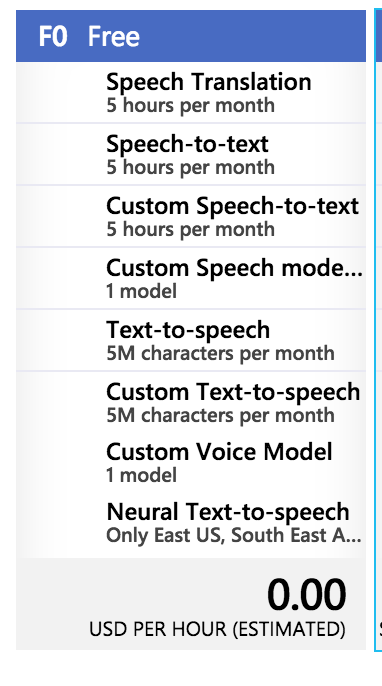The goal of mscstts is to provide an R Client for the
Microsoft Cognitive Services Text to Speech REST API, including voice
synthesis. A valid account MUST be registered at the Microsoft Cognitive
Services website https://azure.microsoft.com/en-us/free/cognitive-services/
in order to obtain a (free) API key. Without an API key, this package
will not work properly.
See the documentation here: https://learn.microsoft.com/en-us/azure/cognitive-services/speech-service/overview
You can get a TTS API key here: https://azure.microsoft.com/en-us/free/cognitive-services/. The API you need to get one from is Cognitive Services, Speech.
+ Create a Resource+ Create
You can set up your API key in a number of ways (where
XXX is your API key):
~/.Renviron and set
MS_TTS_API_KEY = "XXXX"R, use
options(ms_tts_key = "XXXX").export MS_TTS_API_KEY=XXXX in
.bash_profile/.bashrc if you’re using
R in the terminal.api_key = "XXXX" in arguments of functions such as
ms_list_voices(api_key = "XXXX").You can install mscstts from GitHub with:
# install.packages("remotes")
remotes::install_github("jhudsl/mscstts")library(mscstts)
if (ms_have_tts_key()) {
res = ms_synthesize(
script = "hey, how are you doing? I'm doing pretty good",
output_format = "audio-16khz-128kbitrate-mono-mp3")
tmp <- tempfile("example", fileext = ".mp3")
writeBin(res$content, con = tmp)
mp3 = tuneR::readMP3(tmp)
}
testthat::expect_true(file.size(tmp) > 50000)
if (interactive()) {
player = tuneR::getWavPlayer()
if (.Platform$OS.type == "windows" && is.null(player)) player = NULL
if (.Platform$OS.type != "windows" && is.null(player)) player = "play"
tuneR::play(mp3, player = player)
}